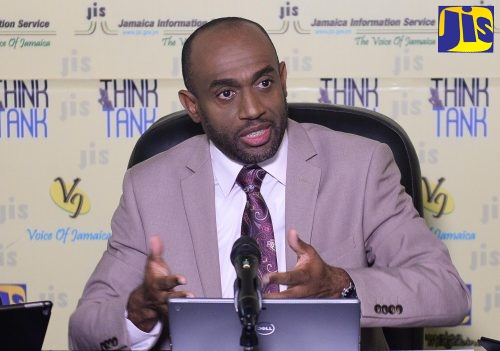BOJ Encouraged by Monetary Policy Success in Reducing Inflation
By: , May 18, 2023The Full Story
The Bank of Jamaica (BOJ) says there has been a general reduction in inflation – that is, the rate of price increases – between April 2022, when headline or year-over-year inflation peaked at 11.8 per cent, and March this year when the out-turn fell to 6.2 per cent.
The term ‘inflation’ is sometimes loosely used to refer to any increase in the price of goods and services.
However, inflation and BOJ’s monetary policy actions to keep the rate of price increases low, stable and predictable are a bit more nuanced.
According to BOJ Division Chief for Research and Economic Programming, Carey-Anne Williams, inflation is not just about the price of one particular item showing an increase.
She defines inflation as a general or broad-based increase in prices, usually measured over a specific period, typically a year.
“You can’t look at, say, the price of patties or a utility bill, and say inflation has gone up. You have to look at a range of goods and services,” Ms. Williams says.
The type and number of goods and services measured are determined by a household expenditure survey done by the Statistical Institute of Jamaica (STATIN).
“Based on that survey, they tell us what the typical Jamaican consumes over any specific period. That determines a basket of goods and services, which includes many things. It has food, utilities, transport, what you spend on health services, and education. It’s really capturing a gamut of things that you spend on typically,” Ms. Williams says.
She adds that, from that process, BOJ is able to track how the costs for these goods and services change over time, pointing out that the increase in the price levels over time is referred to as inflation.
“So yes, it will include patties. But everything else in that basket is also tracked, and the balance of what goes up and down determines where inflation falls,” she further notes.
The Central Bank says although there are other broad-based views of inflation, it focuses on consumer inflation, and the Government sets an annual target of four to six per cent, which is believed to be a manageable rate in Jamaica.
“I want to add that while the [Consumer Price Index] CPI captures inflation from a consumer point of view, there are other measures of inflation. You have inflation from a business perspective, which will focus on the selling price of what businesses produce,” Ms. Williams explains.
Inflation is managed by the BOJ utilising a monetary policy. This comprises a set of actions by the Central Bank that can be broken down into three categories – the influence over interest rates, the ability to control money supply within the financial system, and communication, by which BOJ keeps stakeholders abreast of its actions.
The Bank of Jamaica (Amendment) Act, 2020, fully bestowed on the central bank the mandate of price stability, interpreted as keeping the rate of price increases low, stable, and predictable. This means that the BOJ is empowered by law to keep inflation within the set target range.
Utilising a Forecast and Policy Assessment System, the BOJ’s team of economists and analysts track inflation and provide projections of where the rate of price increases is expected to be in the future.
The team provides the Bank’s Monetary Policy Committee (MPC) with monetary policy advice eight times per year and enables that body to make and communicate its decisions about BOJ’s monetary policy stance.
The BOJ’s robust modelling is able to provide a snapshot of inflation projections two years ahead, and is in line with globally accepted methods of tracking, managing and analysing inflation.
The Central Bank’s Senior Deputy Governor, Dr. Wayne Robinson, shares with JIS how the institution has used its monetary policy to impact the pace of inflation since September 2021.
“Bank of Jamaica adopted a three-pronged policy strategy. One, we increased our policy rate… that is the interest rate that we pay on deposits that commercial banks hold at Bank of Jamaica… from 0.5 per cent to [its current level of] seven per cent,” he informs.

By doing this, they were able to signal to the banks, and the financial markets in general, that higher interest rates were warranted in the economy.
“The other strategy is that we tightened the amount of Jamaican dollars, or what we call the money supply, that is available in the financial system. The third aspect [is] we were more aggressive… in terms of our sales of foreign exchange to the market,” Dr. Robinson elaborates.
These strategies were pursued alongside improved communication, resulting in a significant reduction in… exchange rate volatility.
“You will actually notice that, certainly, for all of 2022 and going into 2023, the exchange rate has been fairly stable,” Dr. Robinson says.
“What this stability has done is that it has reduced or dampened the impact of the rise in imported prices on domestic prices, and we think that is very important,” he adds.
The increase in the signal or policy rate and the tightening of Jamaican dollar liquidity are also intended to reduce or slow the amount of credit that banks provide to businesses and households. They are also meant to encourage saving by Jamaicans in general.
“This is important because in managing inflation, we not only have to manage the exchange rate but we also have to manage demand in the economy,” Dr. Robinson says.
According to the BOJ representatives, credit conditions have started to tighten in the economy and commercial banks and other deposit-taking institutions have been increasing some of their lending rates.
This means that, as the monetary policy takes effect, some slowing in credit growth is expected.
Dr. Robinson points out that it takes some time for BOJ’s monetary policy actions to filter through to the economy.
“So, as the effects begin to filter through, we expect that the downward trend in inflation will continue,” he adds.



